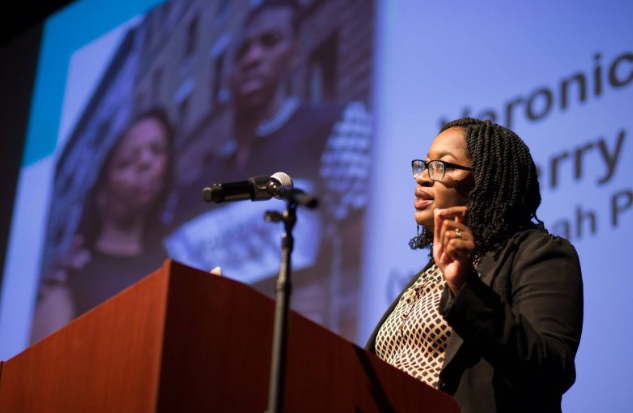By Pearl Stewart
Diverseeducation.com

The title of Dr. Keisha Blain’s critically acclaimed new book, Set the World on Fire, about Black nationalist women may portend her own future as a scholar and historian. This work and her other projects reveal a woman ablaze with momentum.
Blain, an assistant professor of history at the University of Pittsburgh, focuses her research on Black women who for the most part have been overlooked or under-appreciated for their pivotal contributions to freedom movements from the early 20th century to the 1960s.
Publisher’s Weekly, in a starred review, says Blain’s book “illuminates an oft-ignored period of Black nationalist and internationalist activism in the U.S.: the Great Depression, World War II, and early Cold War. Her engrossing study shows that much of this activism was led by African-American and Afro-Caribbean women.”
Blain, who received her bachelor’s degree in history and African-American studies from Binghamton University, SUNY, and her Ph.D. in history from Princeton University, tells Diverse that her interest in these women began with an undergraduate course at Binghamton.
She says the course, on global Black social movements in the U.S., Caribbean, Latin America and Africa, examined “the ways in which Black people worked together, also collaborating with various other groups to obtain citizenship rights [and] human rights.”
Once her interest was sparked, Blain says, “I wanted to understand more about ways in which Black women were critical to the movement — the kinds of things they did and the ways in which they were able to advance the cause of Black liberation.”
Blain’s book, written in a flowing, narrative style, is populated by such fascinating figures as Mittie Maud Lena Gordon, who was arrested in 1942 for sedition and conspiracy for urging Black people not to serve in World War II. She was convicted and served two years in prison.
And then there are Amy Ashwood Garvey, Black Nationalist leader Marcus Garvey’s first wife and co-founder of the Universal Negro Improvement Association (UNIA), and his second wife Amy Jacques Garvey, a prolific writer-activist and defender of the movement to relocate 13 million Black Americans to Liberia.
There is also Celia Jane Allen, who organized Black workers in the 1930s in rural Mississippi amid Jim Crow violence.
Blain is also interested in contemporary topics. She and Johns Hopkins University historian Dr. N.D.B. Connolly co-authored a crowd-sourced reading list titled “Trump Syllabus 2.0,” which examines the historical and political origins of “Trumpism” — a term the authors define as “personal and political gain marred by intolerance, derived from wealth, and rooted in the history of segregation, sexism, and exploitation.” The syllabus, compiled in response to a previous crowd-sourced effort that Connolly and Blain found lacking in diversity, has been featured in numerous national publications and has gone viral on the internet.
The online journal Public Books (publicbooks.org) in September 2017 hailed “Trump Syllabus 2.0” as #1 on its “most-read articles” list, stating “… this syllabus acknowledges the intersectional nature of power and politics. The course emphasizes the ways that cultural capital like Trump’s grows best under certain socio-economic conditions.”
Blain has also researched the Charleston, South Carolina, mass murders. She is one of the co-editors of the book Charleston Syllabus: Readings on Race, Racism and Racial Violence. Written in the months following the 2015 mass murder of African-Americans at Emanuel AME Church, it is a collection of articles on subjects ranging from the Confederate flag to the role of the Black church in the civil rights movement.
Blain was also known as a scholarly blogger in her previous position as an assistant professor at the University of Iowa (UI). An article “The Roots of Afro-Asia,” published by UI, stemmed from her research on Afro-Asian collaborations and began as one of her blogs. She explains that she enjoys enlightening students through blogs about these little-known subject areas.
“More often than not, when my students hear the terms ‘Afro-Asian solidarity,’ they usually point to the Rush Hour movies, featuring the talented duo Jackie Chan and Chris Tucker,” she wrote, adding that she watches their faces light up with the thought that she might show a clip from the movie. Instead, she introduces them to other aspects of Black Internationalism.
Blain points out that, often, the first question she gets after a lecture about Black nationalist women is about Marcus Garvey, not about the women she just discussed. “We have to fight to get out of the societal structures and barriers that shape how we see the world — and that’s not an easy exercise,” she says.
“In many ways, the scholarship that we produce is a reflection of the society in which we live, and so it’s not surprising that you find all these narratives — and historians will write books and articles — that tend to be male-dominated.”
Just as she was inspired by an undergraduate history class, Blain says she is gratified when her students are encouraged in the same way. “I’m excited when students say that being in my class has sparked their interest in a particular topic and they say, ‘I want to write more and I want to take more classes.’”




